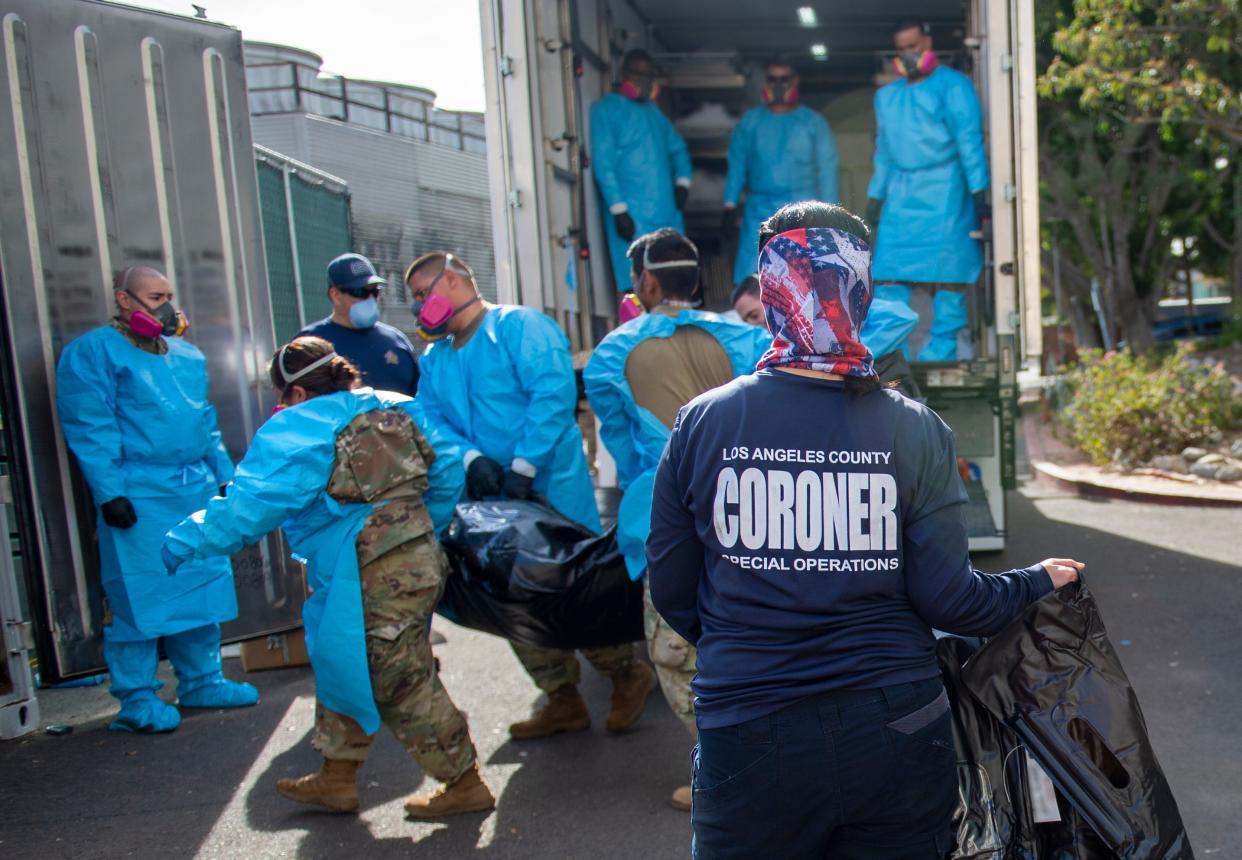California should split the roles of sheriff and coroner. It's good for cops, and the public

- Oops!Something went wrong.Please try again later.
Five years ago, San Joaquin County’s chief forensic pathologist and one of his colleagues resigned, saying Sheriff-Coroner Steve Moore butted into their autopsies and death investigations to protect cops.
Dr. Bennet Omalu was hardly unknown. A neuropathologist, he came to national attention for his work documenting degenerative brain disease called chronic traumatic encephalopathy, or CTE, in football players. That was while he was working at the Allegheny County coroner's office in Pittsburgh. If you saw the 2015 Will Smith movie “Concussion,” you’re familiar with his work.
Omalu later came to California, and his boss ended up being Moore. Omalu said the sheriff-coroner “made calculated attempts to control me as a physician and influence my professional judgment.” Omalu and his coworker, Dr. Susan Parsons, recounted running into long delays in getting written reports from sheriff’s investigators needed to complete death investigations cases. They said several times, a sheriff’s deputy who oversaw coroner operations directed technicians to cut hands off bodies — without the doctors’ knowledge, consent or supervision.
In a memo, the doctors added they felt “extremely intimidated, harassed, threatened and controlled by some of the practices, cultures and traditions of the sheriff’s office.” In three death cases in which law enforcement was involved, doctors and technicians said Moore ordered the cause of death to be changed from “homicide” to “accident.”
Moore denied the accusations, but an independent audit confirmed “several cases” where Moore labeled an officer-involved fatality an accident, over the opinion of the forensic pathologist who did the autopsy. The San Joaquin County Board of Supervisors responded by breaking off coroner duties from the sheriff and creating a separate, appointed chief medical examiner’s office.
That makes a lot of sense. But as it stands now, that division of duties is a rarity in California — 48 of our 58 counties have a combined sheriff-coroner office, including Riverside County.
However, a measure pending in the California Legislature, Assembly Bill 1608, would require all counties to split the functions, including here in Riverside County. We support the bill, and we urge our local representatives to do so too.
It’s not rocket science to see how this would remove conflicts of interest — both real and perceived. At best, the current system builds in a cloud of suspicion over law enforcement for those disinclined to trust the police — even when those in the roles are ethical and upstanding. At worst, it leads to situations like the one in San Joaquin County.
Dividing the offices will increase transparency and ensure greater objectivity in determining the cause of death of an individual — particularly those that occur in county jails or in encounters with law enforcement. That’s good for the public, and good for law enforcement officers.
The measure does raise some questions: If the sheriff is not going to oversee coroner operations, who should? In Los Angeles County, which splits the roles, the coroner reports to the board of supervisors. That also seems to make little sense. Why not put the coroner under, say, the Department of Public Health?
The role of sheriff and coroner were not always so unified in California. Riverside County’s coroner office was first established in 1893, and it wasn’t until 1999 that it was combined with the sheriff’s department, in a cost-saving move. In San Bernardino County, the tie-up was even more recent.
There, Sheriff Shannon Dicus, shortly after taking office, sharply curtailed communications from the coroner’s division, saying it was adopting new procedures because “some deference is proper when other divisions are involved in certain incidents.” Make no mistake who that deference was to — the sheriff’s department!
Not surprisingly, Riverside County Sheriff Chad Bianco opposes the bill. “This bill is nothing more than a continuation of an agenda to eliminate the Office of Sheriff and paint law enforcement as corrupt,” Bianco told The Desert Sun.
That’s the kind of hyperbole Bianco is all too prone to. The clear intent of this legislation is to disassemble a natural conflict of interest, but Bianco’s too concerned with preserving his influence to see the greater good. The fact is, California is one of a few states where the role is allowed to be combined. Many “Red States” mandate the separation of functions, and nobody in those jurisdictions is claiming it’s a travesty.
Bianco raised concerns that the division of roles could increase costs. That might be the case, at least in the short term, though we can’t imagine they would be that high. Simply moving the office under another county division, like the Department of Public Health, could probably result in about the same level of efficiencies supposedly achieved by the current setup.
Moreover, the bill does include language noting that the California Constitution requires the state to reimburse local agencies for certain costs mandated by the state. In this case, if the Commission on State Mandates determines that AB 1608 contains costs mandated by the state, reimbursement for those costs are to be made pursuant to the rules on the books.
We’re aware those reimbursements rarely cover all the costs, but even if the Riverside County supervisors have to scrape together some nickels to make the change, it would be money well spent. More important is where they decide to relocate the coroner’s office and what kind of oversight it receives. If the bill becomes law, supervisors need to devote care and attention to this task.
AB 1608 is good for police, and it’s good for the public. It deserves to become law.
Editor's note: A previous version of this editorial contained the wrong number for the Assembly bill in question.
This article originally appeared on Palm Springs Desert Sun: Why California should split the roles of sheriff, coroner

